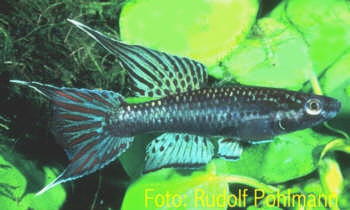| Meaning
of Name |
After
the sombre colouration. lugens means to mourn. |
| First
Description |
Amiet
J.L. 1991. Diagnoses de deux especés
nouvelles d'Aphyosemion du Cameroun (Teleosti:
Aplocheilidae). Ichthyological Exploration
of Freshwaters 2 (1): p 85-89, figures, map. |
| Size |
5 cm |
| Meristics |
D = 12, A = 14-15 (Amiet 1991) |
| Karyotype |
n = 18, A = 24
|
| Sub-Genus |
Chromaphyosemion |
| Group |
|
| Synonyms |
|
Populations
- Afan Assokié (Essokié
?)(Littoral Province, southwestern Cameroon)
- Mamelles
- ABC 05 / 28 - Fenda
- ABC 05 / 52 - Afan
Essokié
- ABC 05 / 53 - East
of Afan Essokié
- ABC 05 / 54 - N'koleon
- ABC 05 / 55 - Gate
of the Campo Park
- HLM 99 / 28 - Afan
Essokié
- KEK 98 / 5
|
Afan Essokié - Also
known from (Afan Essokié) collection points HLM 99 / 28, ABC
05 / 52 & ABC 05 / 53 (just east of).
In BKA newsletter No.438, March 2002 Bill Drake wrote a breeding report
on HLM 99 / 28 - Tank set up under a glass roof, water temperature
23-24°C, pH 6·5. The light was probably causing a problem
as no eggs were laid. They were moved to a dark tank. After 4 weeks
only a few eggs were laid. Following a conversation with someone else
they suggested dropping the pH to 5. The pH was dropped from 6·5
to 5 & within 48 hours 20 eggs were laid. During the next week
4-5 eggs were laid & then they stopped laying. After a water change
the pH was lowered to 4·5. Eggs started to appear at 4-5 per
day for 6 weeks & then stopped. Many eggs during this time went
fungussed.
After 12 weeks spawning resumed for 6 weeks then stopped. Less eggs
are laid with each new spawning period. The pH when raised produced
fewer eggs but an acid pH caused mostly females to develop. At pH
5·5 an F1 pair produced mainly males. Only 40% of these eggs
were fertile.
He found when the pH rises the fertility drops to 30% but the number
of males increases. At pH 6·5 spawning stops.
A temperatue of 20°C causes a stop in egg production. Best temperature
is 22-24°C. Spawning stops at 26°C.
Water incubated eggs take 14-17 days to hatch. Fry will take newly
hatched brine shrimp as a first food but growth is slow. Males can
be identified at 6 months.
|
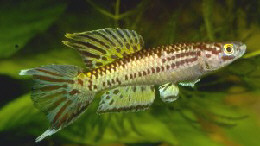
Afan Essokie
Photo courtesy of Maurice Chauche & the
KCF website.
|
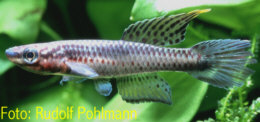
HLM 99 / 28
wild female.
Photo courtesy of Rudolf Pohlmann.
|
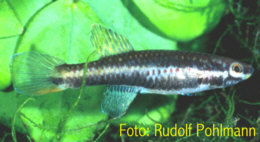
HLM 99 / 28
wild female.
Photo courtesy of Rudolf Pohlmann.
|
|
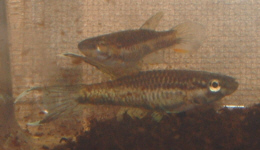
Afan Essokie HLM 99
/ 28 taken at the
2003 BKA convention.
|
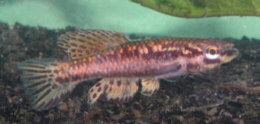
HLM 99 / 28.
Photo courtesy of Vasco Gomes.
|
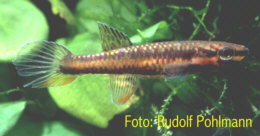
HLM 99 / 28
wild female.
Photo courtesy of Rudolf Pohlmann.
|
KEK 98 / 5 - Collected
by Uwe Kämpf, Wolfgang Eberl & Andreas Kliesch, January 1st
- 12th 1998, Cameroon.
|
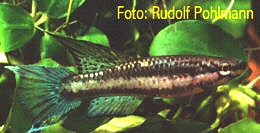
KEK 98 / 5.
Photo courtesy of Rudolf Pohlmann.
|
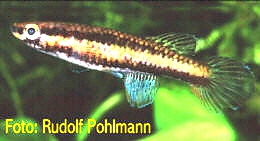
KEK 98 / 5.
Photo courtesy of Rudolf Pohlmann.
|
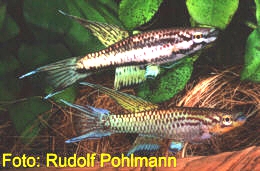
KEK 98 / 5
+ sp. No. 6.
Photo courtesy of Rudolf Pohlmann.
|
|
| Type
Locality |
Afan
Assokié. |
| Distribution |
Known from two localities; in the Bitandé drainage
which drains into the Ntem River drainage; & also in the Lobe River drainage
of southwestern Cameroon at the Massif des Mamelles. |
| Habitat |
Small forest creeks. |
| Distinguishing
Characteristics |
|
| Colour/Pattern
Variability |
Low |
| History |
|
| Breeding
Notes |
Regarded
as a difficult species to breed. Eggs should be collected as the parents are known
to eat fry. Water incubation takes 12-14 days with sexual maturity taking around
8 months. |
| Diameter
of Egg |
|
| Remarks |
|
